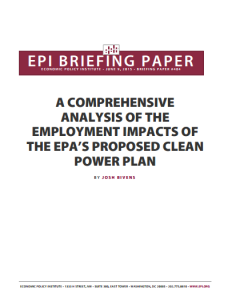Full Title: A Comprehensive Analysis of the Employment Impacts of the EPA's Proposed Clean Power Plan
Author(s): Josh Bivens
Publisher(s): Economic Policy Institute (EPI)
Publication Date: June 1, 2015
Full Text: Download Resource
Description (excerpt):
Estimates made by the Environmental Protection Agency of the likely employment effects of a proposed rule (the Clean Power Plan or CPP) mandating reductions in greenhouse gas emissions from existing power plants are likely incomplete. These estimates undercount both positive and negative influences on employment. This paper provides a comprehensive overview of the channels through which the mandated emission reductions may lead to employment changes, both positive and negative. It finds that the CPP is likely to lead to a net increase in of roughly 360,000 jobs in 2020, but that the net job creation falls relatively rapidly thereafter, with net employment gains of roughly 15,000 jobs in 2030. This paper also provides comparisons of the composition of employment in job-gaining versus job-losing industries. While workers in job-losing industries are less likely to have four-year college degrees, jobs in these industries are far less likely to be low-wage than in the overall economy, or in job-gaining industries. Workers in job-losing industries are also substantially more likely to be represented by a union. The characteristics of employment in job-losing industries, as well as the likely geographic concentration of gross job losses in poorer states, is likely to lead to transition challenges for workers and communities in responding to the CPP. This suggests the potential for a key role for federal assistance and complementary policies to aid these groups.
